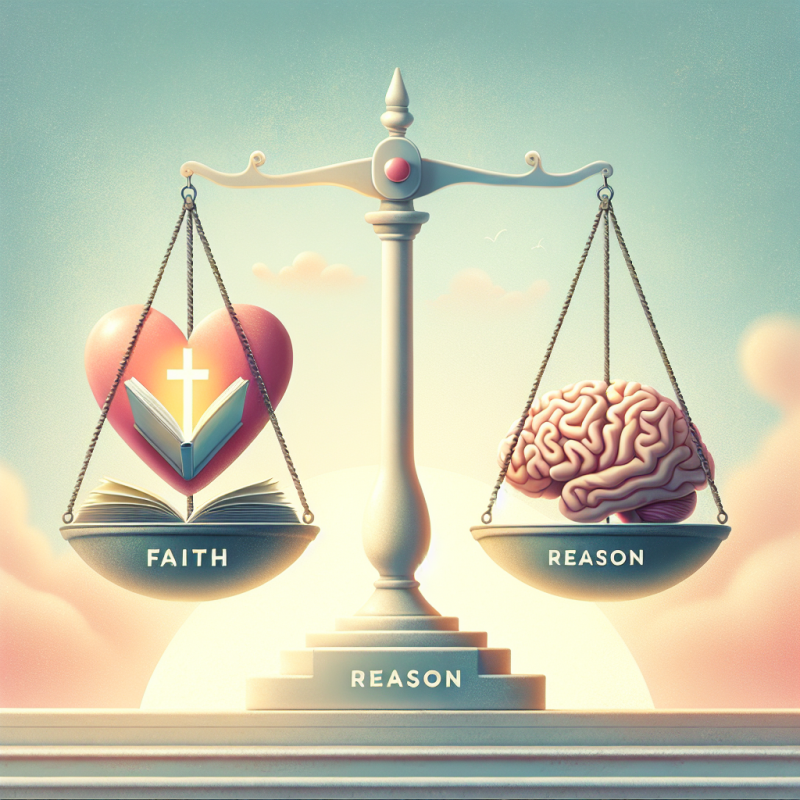The Interwoven Path of Faith and Reason: A Unified Approach to Truth
Throughout history, faith and reason have frequently been seen as opposing forces—the former relying on spiritual conviction and the latter on logical deduction. However, as explored in previous discussions such as Faith and Reason: How They Work Together to Reveal Truth and Faith and Reason: A Harmonious Path to Truth, these two elements are not adversaries but complementary tools that guide believers toward a deeper understanding of reality.
Faith and Reason: A Synergistic Relationship
Rather than seeing faith and reason as disconnected, it is helpful to recognize their interwoven nature. Faith provides meaning, purpose, and trust in divine revelation, while reason helps us interpret, understand, and apply that faith in practical and intellectual ways.
For instance, consider theological study. While faith compels one to believe in the truths of Scripture, reason allows for the careful exegesis of biblical texts, ensuring a proper understanding. Faith without reason can lead to blind adherence, while reason without faith can result in a purely intellectualized, cold spirituality. Together, they create a rich and grounded belief system that withstands both emotional and intellectual challenges.
Image: [1, Bible study with open book and glasses]
Biblical and Historical Foundations
The Bible itself presents faith and reason as allies, not adversaries. In Isaiah 1:18, God invites His people to reason with Him: “Come now, let us reason together, says the Lord.” This invitation demonstrates that faith is not a rejection of reasoning but is instead enriched by it.
Throughout Christian history, many great thinkers have embraced both faith and reason. St. Augustine, for example, emphasized that belief and understanding go hand in hand, famously stating, “I believe in order to understand, and I understand in order to believe.” Similarly, St. Thomas Aquinas sought to reconcile faith and logic, arguing that truth derived from reason cannot contradict divine revelation, as all truth comes from God.
This rich intellectual tradition highlights how faith and reason do not merely coexist but actively enhance and bolster one another.
Image: [2, St. Augustine writing with a quill in candlelight]
Faith and Reason in a Modern Context
In an era of skepticism, some perceive faith as irrational or contrary to scientific inquiry. However, this perspective often arises from a misunderstanding of both faith and reason. Science itself is built on certain foundational assumptions—truths that must be taken on faith, such as the reliability of human perception and the consistency of natural laws.
Similarly, reason cannot explain everything. Philosophical and ethical questions, such as the meaning of life and the existence of objective morality, often transcend pure logic. Faith fills these gaps, offering a moral compass and an overarching sense of purpose.
By embracing both faith and reason, one can navigate life’s complexities without falling into either blind belief or cynical skepticism. In essence, faith provides the “why,” and reason provides the “how.” Together, they illuminate the path to deeper knowledge and spiritual fulfillment.
Image: [3, A person contemplating under the night sky with stars]
Conclusion
Faith and reason are not competing forces but cooperative allies in the pursuit of truth. As explored in several previous articles like Bridging Faith and Understanding and The Harmony of Faith and Reason: A Lifelong Journey Towards Truth, this unity enables believers to grow both spiritually and intellectually.
By holding faith and reason in balance, one can remain both intellectually honest and spiritually steadfast, ensuring that belief is not only heartfelt but also thoughtfully examined. This perspective strengthens faith, deepens understanding, and leads to a more profound relationship with God.




Many dismiss faith as subjective emotion and reason as cold logic, yet history and Scripture show their harmony. Faith gives meaning, reason refines understanding.
A thought-provoking piece. Too often, discussions on faith pit it against reason instead of seeing them as partners. This balance is crucial in navigating life’s deeper questions.